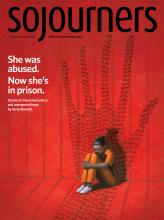WHEN I FIRST SPOKE with Rosa Sabido, she had been in sanctuary at Mancos United Methodist Church in Colorado for 75 days. She sleeps in a makeshift room in what used to be the church’s nursery, the head of her bed resting against a small mural of Noah’s Ark. Members of the church donated a bed, a dresser, and a computer with internet access and also installed a shower in the room itself.
Most days she has visitors, including members of the church and her parents, who take turns sleeping in a nearby office during the night and keep Sabido company during the day. She bakes when she feels inspired and sometimes joins church members in practicing yoga. But Sabido is clear: Sanctuary isn’t glamorous.
“The hardest thing is having to depend on someone,” said Sabido. “I have always been self-sufficient, always working to fulfill my needs and my parents’ needs.”
Sabido was raised in Mexico City but fled to the U.S. in 1987 due to the city’s increasing violence; she was 23. For the past 30 years, Sabido has lived in Cortez, Colo., a small town where her mother is a legal resident and her stepfather is a naturalized citizen. Sabido worked as a secretary at a nearby church and prepared taxes at H&R Block, using her salary to support her parents.
But since Sabido didn’t have documents that would allow her to stay in the U.S. permanently, she used visitor visas to travel between Mexico and the U.S. In 1998, she was stopped at the airport and deported back to Mexico City.
Read the Full Article

